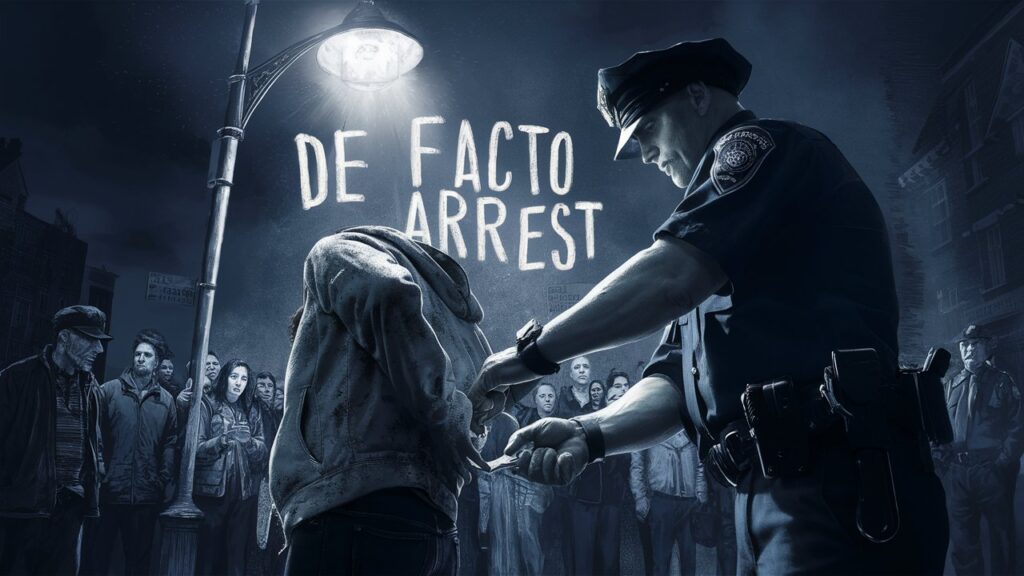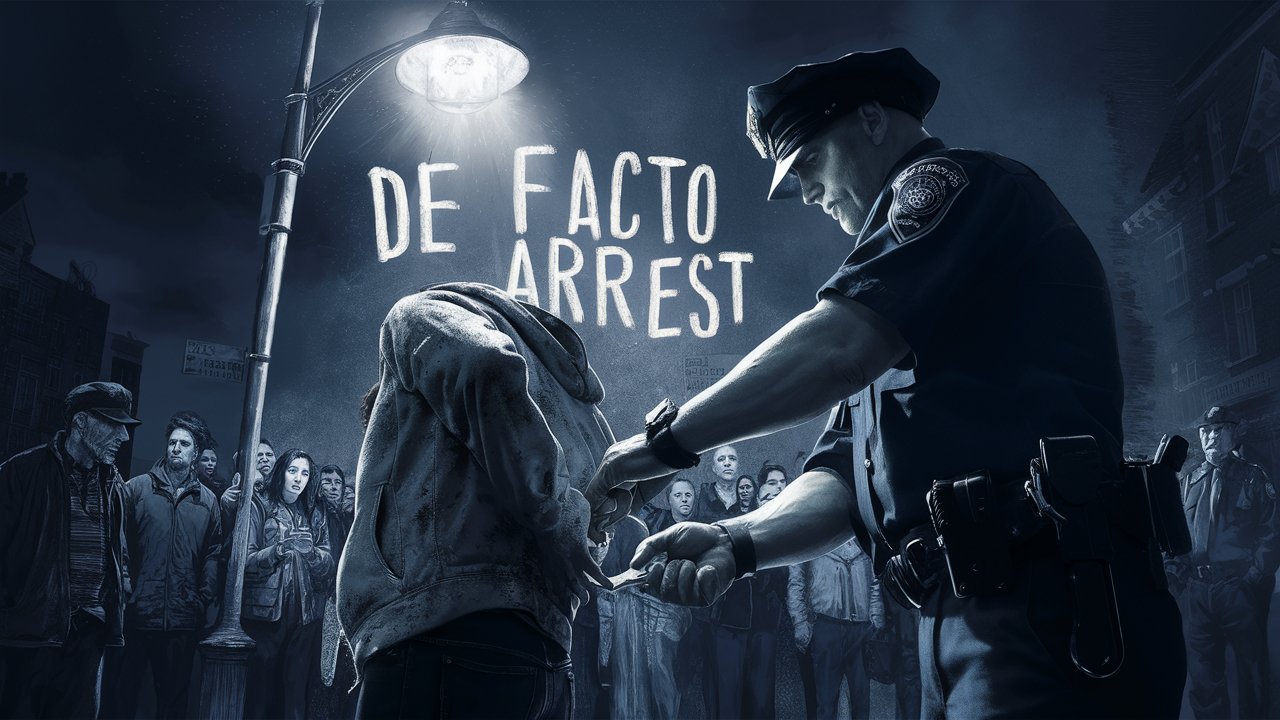
Introduction
The concept of “de facto Arrest” is a basic, however frequently misjudged, viewpoint of criminal law. Not at all like a formal capture, where an person is expressly taken into guardianship by law authorization, a de facto capture happens when a person’s opportunity of development is confined to a degree that viably constitutes an capture, indeed if no formal statement has been made. Understanding what de facto capture involves, how it varies from formal capture, and what your rights are in such circumstances is fundamental for anybody exploring the complexities of the legitimate system.
1. What Is De Facto Arrest?
1.1. Definition of De Facto Arrest
De facto capture alludes to a circumstance where law requirement officers confine an individual’s opportunity of development in such a way that it sums to an capture, indeed if no formal capture strategies, such as perusing Miranda rights or booking, have been taken after. The key calculate in deciding whether a de facto Arrest has happened is whether a sensible individual would feel that they were not free to leave.
1.2. How De Facto Capture Contrasts from Formal Arrest
In a formal capture, the person is unequivocally educated that they are beneath capture, and law authorization officers ordinarily take after particular methods, such as binding the person and taking them to a police station. In differentiate, a de facto capture may happen without any formal affirmation, frequently amid what starts as a schedule halt or interrogation.
2. Lawful Premise for De Facto Arrest
2.1. Fourth Alteration Protections
The Fourth Correction of the Joined together States Structure secures people from outlandish looks and seizures, counting illegal captures. A de facto capture, if decided to be outlandish, may damage these securities, driving to potential lawful results for law authorization and the avoidance of prove gotten amid the arrest.
2.2. Court Interpretations
Courts have reliably held that the assurance of whether a de facto capture has happened depends on the totality of the circumstances. Variables such as the term of the detainment, the nature of the addressing, and the utilize of physical limitation are all considered when evaluating whether a de facto capture has taken place.
3. Illustrations of De Facto Arrest
3.1. Activity Stops That Escalate
A common situation in which a de facto capture might happen is amid a schedule activity halt that raises. If an officer confines the driver for an amplified period, employments coercive strategies, or confines their development in a way that makes the driver feel they cannot take off, this may be considered a de facto arrest.
3.2. Police Interrogations
Another case is amid a police cross examination. If the person is told they are not beneath capture but is at that point addressed for hours, physically limited, or restricted to a room, the circumstance may qualify as a de facto arrest.
3.3. Utilize of Drive or Physical Restraint
Even without unequivocal verbal affirmation, the utilize of constrain or physical restriction, such as binding an person or putting them in a watch car, can lead to a de facto capture. The key thought is whether the person’s flexibility to take off has been essentially restricted.
4. Legitimate Suggestions of De Facto Arrest
4.1. Infringement of Protected Rights
If a de facto capture is regarded illegal, it can lead to critical lawful repercussions, counting the infringement of the individual’s Fourth Correction rights. Such infringement can result in the concealment of any prove gotten amid the capture, which can debilitate the prosecution’s case.
4.2. Potential Gracious Liabilities
Law requirement officers and organizations may moreover confront gracious liabilities if a de facto capture is found to be illegal. The person who was subjected to the capture may be entitled to sue for harms, especially if the capture was conducted with over the top constrain or without plausible cause.
4.3. Affect on Criminal Proceedings
In criminal procedures, if a court decides that a de facto capture happened without appropriate lawful avocation, any explanations made or prove gotten amid the capture may be regarded forbidden. This can have a critical affect on the result of the case, possibly driving to the expulsion of charges.
5. Your Rights Amid a De Facto Arrest
5.1. Right to Stay Silent
One of the most basic rights you have amid any interaction with law requirement, counting a de facto capture, is the right to stay noiseless. You are not committed to reply questions that might implicate you, and working out this right can secure you amid legitimate proceedings.
5.2. Right to an Attorney
If you accept you are being subjected to a de facto capture, you have the right to ask an lawyer. Having legitimate representation can offer assistance guarantee that your rights are ensured and that any activities taken by law authorization are challenged if they damage legitimate standards.
5.3. Challenging the Capture in Court
If you are subjected to a de facto capture, it is basic to challenge the lawfulness of the capture in court. A talented lawyer can contend that the capture was illegal and look for to have any prove gotten as a result prohibited from your case.
6. How to Handle a De Facto Capture Situation
6.1. Remain Calm and Composed
If you discover yourself in a circumstance that may be considered a de facto capture, it is significant to stay calm and composed. Maintain a strategic distance from raising the circumstance, as standing up to or contending with law requirement can lead to encourage complications.
6.2. Archive the Interaction
If conceivable, archive the interaction with law authorization. This can incorporate taking note of the officer’s identification number, the time and area of the occurrence, and any particular activities taken by the officers that limited your movement.
6.3. Look for Legitimate Counsel Immediately
After the occurrence, look for legitimate counsel quickly. An lawyer can audit the circumstances of the capture, decide whether it was legal, and prompt you on the best course of activity to ensure your rights.
7. The Part of Lawful Representation in De Facto Capture Cases
7.1. Significance of Experienced Lawful Counsel
Having experienced legitimate direct is basic in de facto capture cases. A learned lawyer can evaluate whether the capture was legal, challenge any prove gotten as a result, and speak to you in court proceedings.
7.2. Potential Legitimate Defenses
There are a few potential lawful protections that may be pertinent in de facto capture cases, counting challenging the need of plausible cause, contending that the detainment was not sensibly vital, or illustrating that the capture abused your sacred rights.
7.3. Recording a Respectful Lawsuit
If your rights were abused amid a de facto capture, your lawyer might prompt you to record a respectful claim against the law authorization officers or organization included. This can result in emolument for harms, counting enthusiastic trouble, misplaced compensation, and lawful fees.
8. De Facto Captures in the Setting of Racial Profiling
8.1. Unbalanced Affect on Minority Communities
De facto captures frequently excessively affect minority communities, where people may be subjected to illegal detainments based on racial profiling. This raises critical concerns almost break even with assurance beneath the law and the require for more noteworthy responsibility in law requirement practices.
8.2. Legitimate Response for Casualties of Racial Profiling
Victims of racial profiling who encounter de facto captures have legitimate response, counting recording complaints with gracious rights organizations, looking for change through the courts, and supporting for approach changes to anticipate future incidents.
Conclusion
De facto capture is a complex legitimate issue that has critical suggestions for individuals’ rights and flexibilities. Whereas it may not include the customs of a conventional capture, it can have similarly genuine results, counting infringement of sacred rights and the potential for respectful and criminal punishments. Understanding your rights in such circumstances, knowing how to react, and looking for legitimate representation are vital steps in ensuring yourself from illegal activities by law authorization. By remaining educated and proactive, you can guarantee that your rights are maintained, and any unjustifiable activities are challenged in court.



